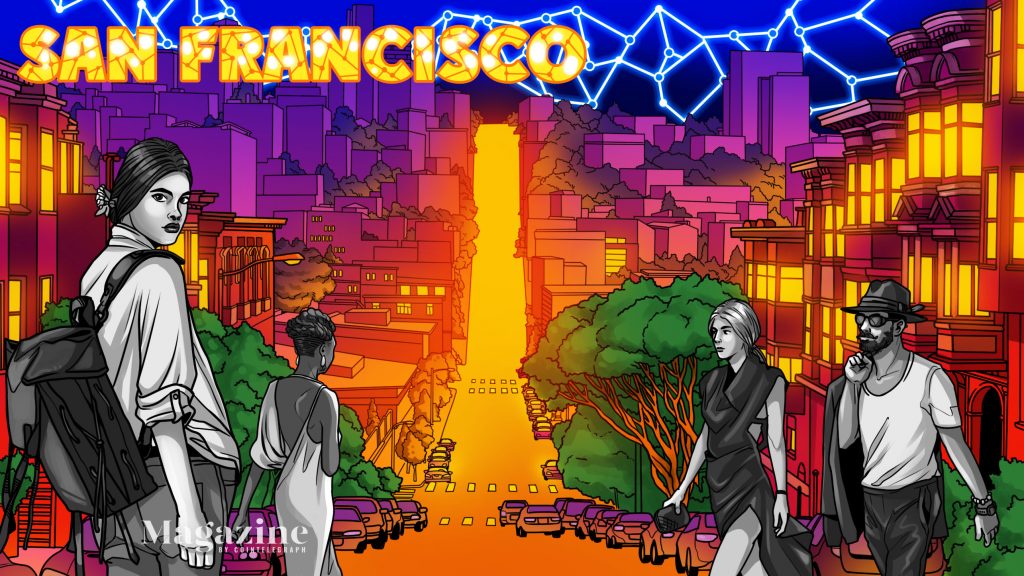This “Crypto City” guide looks at the San Francisco Bay Area’s crypto culture, its most notable projects and people, its financial infras
This “Crypto City” guide looks at the San Francisco Bay Area’s crypto culture, its most notable projects and people, its financial infrastructure, which retailers accept crypto, and where you can find blockchain education courses. You really might leave your heart in San Francisco with all the projects in the Bay Area.
Fast facts
City: San Francisco
Country: United States
Population: 887,711
Founded: 1776
Language: English

Understand
Though not the most populated part of California or the capital city, the San Francisco Bay Area is well-known for its iconic cable cars, views of the Golden Gate Bridge, and Silicon Valley — both the television series and the real-life tech hub. Originally a Spanish colony and later part of Mexico before becoming a city in the U.S. state of California, many residents live in buildings more than 100 years old.

San Francisco is known for its proximity to the San Andreas Fault, responsible for some of the most devastating earthquakes in U.S. history, including one in 1906 that caused fires that burned down large sections of the city over several days. Another magnitude 6.9 quake hit the Bay Area in 1989, damaging the Bay Bridge between the downtown area and Oakland.
Because many historic buildings and picturesque places have endured despite the earthquakes — and nearby Napa Valley and its wineries may help — San Francisco attracts many tourists from all over the world and has been the filming location for movies too numerous to mention, including The Rock, Mrs. Doubtfire and The Matrix Resurrections. The city also includes the oldest Chinatown in North America, the former military base-turned-park Presidio, Golden Gate Park and the Mission District.
Neighboring cities are separated by the bay but are connected with a network of public transportation. Overall, more than 7 million people live in the area between the wine country in the north and Silicon Valley in the south. The city faces challenges, including one of the country’s largest populations of unhoused individuals, the rising cost of living and other issues common across large urban areas in the United States.
Crypto culture
A tech hub long before the advent of cryptocurrency in 2008, the Bay Area was a natural home for one of the earlier Bitcoin conferences. In San Jose in June 2013, now well-known crypto personalities including Coinbase CEO Brian Armstrong and Bitcoin educator Andreas Antonopoulos spoke to attendees interested in crypto at a time when the space was considered by many to be fringe.
One of the earliest Bitcoin Meetups in the Bay Area happened in January 2013, when organizers Ryan Singer and Jered Kenna — who would go on to co-found Chia Network and become the CEO of the Tradehill exchange, respectively — proposed setting aside the first Tuesday of every month to discuss the crypto asset. Other attendees reportedly included Kraken CEO Jesse Powell, Ripple Labs co-founder Jed McCaleb, Litecoin creator Charlie Lee, and Coinbase’s Fred Ehrsam and Armstrong.
“There were a lot of cypherpunks at those early Bitcoin meetups that I went to,” said Armstrong in a 2021 interview with Initialized Capital founder Garry Tan.
2013: San Jose Bitcoin conference the @coinbase booth was manned just by @brian_armstrong
2021: Coinbase goes public at a $100B market cap pic.twitter.com/wmGyHCb2u5
— Dan Held (In NYC) (@danheld) April 14, 2021
As a predominantly Democratic U.S. state, albeit one containing many conservative voters, California has had its share of lawmakers proposing both pro- and anti-crypto policies as the space evolves. In 2022, the state’s Department of Financial Protection and Innovation issued cease and desist orders against BlockFi, Voyager Digital and Celsius Network related to allegedly offering unregistered securities.
California’s Fair Political Practices Commission also lifted a ban first imposed in 2018, preventing candidates running for state and local offices from accepting donations in crypto. State Senator Sydney Kamlager introduced a bill in February proposing that lawmakers amend the state’s code to allow for the acceptance of cryptocurrencies for certain payments.
Read also
Features
Is China softening on Bitcoin? A turn of phrase stirs the crypto world
Features
Hanko’s Time To Go? Blockchain as a Solution to Japan’s Remote Working Issue
At the state level, Governor Gavin Newsom announced in May 2022 that he had signed an executive order aimed at…
cointelegraph.com
